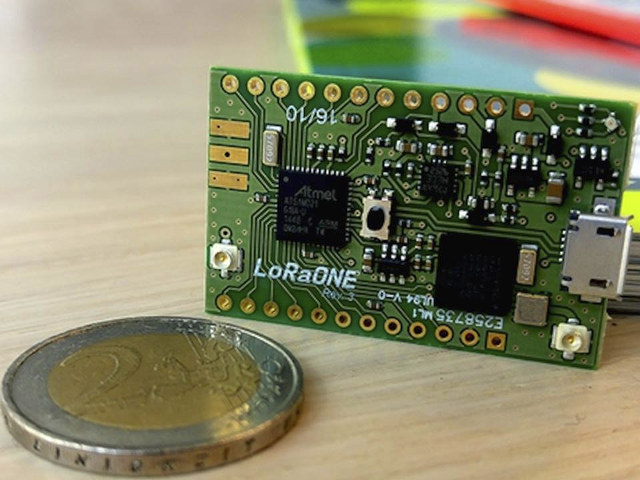While there are many long range LPWAN standards, LoRa appears to be one of the most popular with boards such as LoPy, and now SODAQ LoRaONE module hitting crowdfunding campaigns. LoRaONE is powered by an Atmel Cortex M0+ micro-controller, features Microchip RN2483 or RN2903 LoRaWAN module, GPS, and various sensors.
LoRaONE board specifications:
- MCU- Atmel ATSAMD21G18 ARM Cortex M0+ micro-controller @ 48 MHz with 256 KB flash memory, 32KB SRAM, and up to 16 KB EEPROM (by emulation)
- Connectivity
- LoRa via Microchip RN2483 (433/868 MHz) or RN2903 (915 MHz) module depending on your region
- GPS via u-blox EVA 7M
- USB – 1x micro USB port for power and programming
- Expansion headers (unpopulated)
- 14x digital pin, 12x for analog and 8x for PWM, plus UART, SPI and TWI (I2C)
- Analog output pin – 10-bit DAC
- External Interrupts: Available on all pins
- DC Current per I/O pin: 7 mA
- Operating Voltage – 3.3V
- Breadboard compatible
- Debugging – Serial Wire Interface
- Sensor – Accelerometer & magnetometer (LSM303D)
- Misc – RGB LED, push button
- Power Supply
- 5V USB power
- optional 3.7 LiPo battery
- Solar charge controller, up to 500mA charge current
- Dimensions – 40 x 25 mm
The board can be programmed via the Arduino IDE. You’ll also need to connect to the LoRa network either through your Telco, The Things Network crowdsourced Internet of Things data network, or roll your own LoRa gateway and server. You’ll also have to select the right module fior your country.: 915 MHz for the mareicas, 433/868 MHz for Europe, Russia, South Africa, and Tunisia. If you country is in a gray area there may not be a clear regulation for the frequency bands used by the LoRa network, or required frequencies may not be supported by the currently available LoRa modules.

If you need even further flexibility, a starter kit is also offered with a 800 mAh LiPo battery, a 500mW solar cell, ONEbase expansion board with multiple Grove connectors, and a micro USB cable.
The company is already using LoRaONE in the field for tracking endangered Rhinoceros, as a remote alarm and tracking device for assets, as a panic button for seniors, to monitor when trashcan are full for local governments, tracking containers in harbors, and so on.
https://www.kickstarter.com/projects/sodaq/loraone-the-lora-iot-development-board/description
The project has already surpassed its 20,000 Euros funding target on Kickstarter. All early bird rewards are gone, but you can still pledge 89 Euros ($100) to get the board, or 109 Euros ($123) for the starter kit. Shipping add 5 Euros to the Netherlands, and 15 Euros to the rest of the world, with delivery scheduled for July 2016. That’s quite more expensive than the LoPy LoRa development board, but it has a different set of features such as GPS and an accelerometer, but no WiFi and BLE.
Via Atmel Blog

Jean-Luc started CNX Software in 2010 as a part-time endeavor, before quitting his job as a software engineering manager, and starting to write daily news, and reviews full time later in 2011.
Support CNX Software! Donate via cryptocurrencies, become a Patron on Patreon, or purchase goods on Amazon or Aliexpress






$75 seems a bit excessive for what is essentially an ATSAMD21G18 board with solar charging circuit (<=$15) plus soldered on modules eva-7m (<=$22) & LoRa ($11). After adding the kickstarter fee the bare price is about ~$55, leaving them about $5000 for development, management & marketing, which is just a single man month. so it's actually not that expensive.
However the only arduino/arm-m board with integrated solar lipo charging is sodaq's autonomo ($44), if anyone knows a cheaper alternative please speak up
@bernstein
forgot about nederlands VAT (here $11), after which they’re left with just $9 per device…
Take an ESP8266, and add a Semtech chip at 10EUR, you have the same for 12EUR.
@zoobab
actually semtech only has LoRa chips (SX1276,…) at the same price as the microchip module used here. it’s the gps (+kickstarter+vat) that makes this so expensive… but i concur simply buying eva-7m, lora & solar charging modules and combining with any other arduino/arm-m board is more flexible & far cheaper @ >$38, but requires light soldering and this board will probably come with a preconfigured gps/lora stack making it essentially plug & play… might be worth the $40 difference for many, obviously if you need multiple boards the difference gets prohibitively large…
@bernstein
really not sure why anyone would want just one lora device though…
@bernstein
can i get the full project, if then, where can i get the full project for loraone ?
Hi Sir,
We have a project to provide 150 PANIC BUTTONS for a parking system. We intend to use wireless solution. Could you hardware capable to provide that? Please advice possible solution.
Regards
zulkifli ghapal